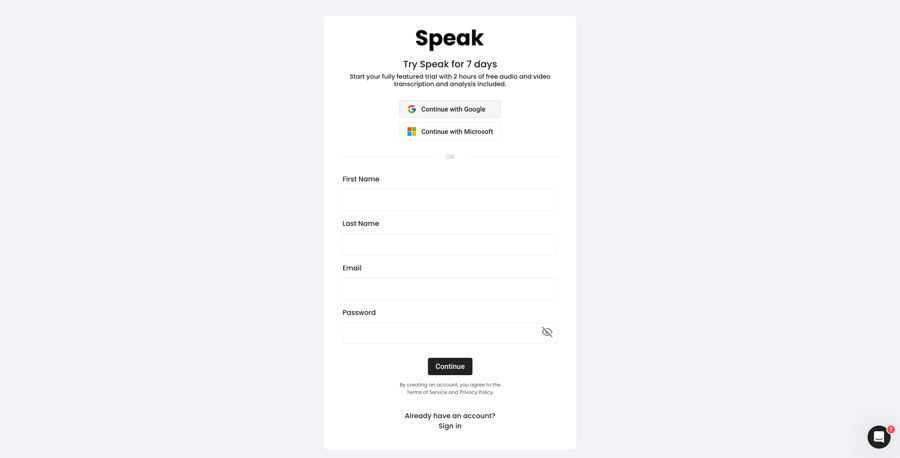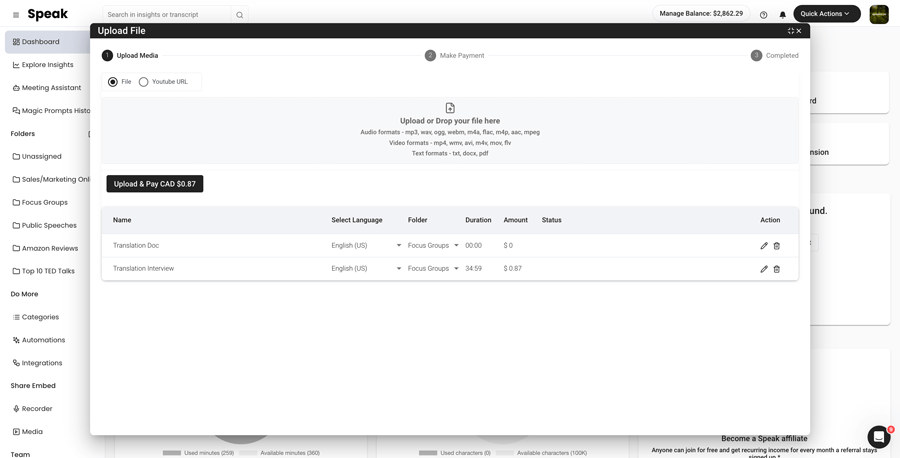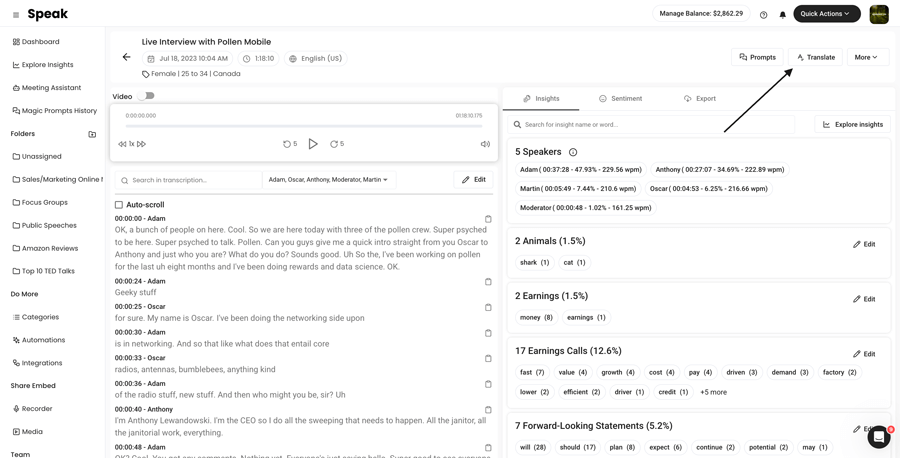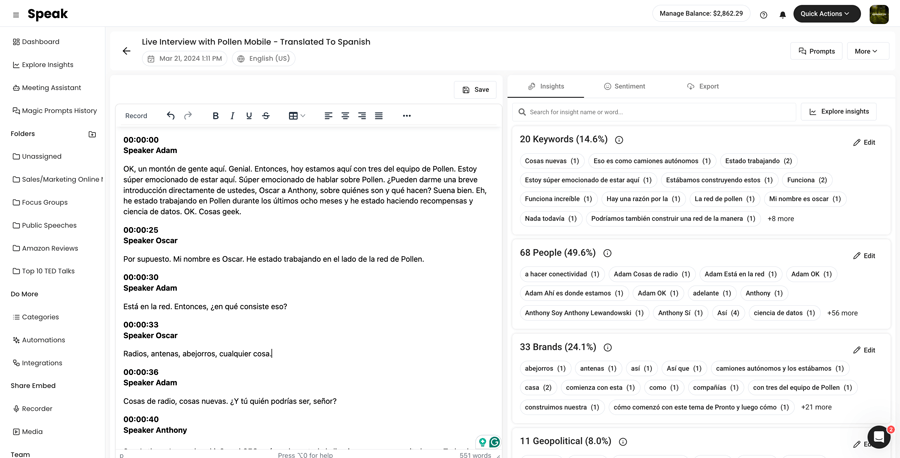How To Translate German to Mizo
Translating German to Mizo is super simple!

Step 1: Register for Speak
Register for Speak using this link.
Once you register, you can instantly begin translating your German to Mizo file(s).

Step 2: Upload Your German file(s)
As soon as you log in, you will be redirected to the dashboard.
Once there, you can select the Quick Action "New Upload".
In Speak, you can seamlessly upload, transcribe and translate audio, video and text files all at once!

Step 3: Translate Your German file(s) to Mizo
Once the file is uploaded, simply visit your file and select "Translate".
If it is an audio and video file, Speak will ask you if you want to keep the speaker names and timestamps in the translation.
Want to translate many files at once? No problem!
You can view the files you want to automatically translate from German to Mizo from the folder level and instantly translate as many files as you need with our artificial intelligence translation in just a few clicks.

Step 4: That's It! View, Analyze, Modify & Export Your New Mizo file(s)
Once the translation is done, you will be alerted and you will see a new document in the same folder your original file is in.
The file will be named the same but with a dash indicating that it is the translated version.
Need support with your German translation?
We are always here and happy to help at Speak!
Just send us a message on live chat on the bottom right corner and we will ensure you are set up for success.
Interested in translating German or other languages to different languages? View our entire list of supported translation languages here.
Automatic, accurate, instant AI translation from German to Mizo is here for you.
Register for Speak using this link and begin translating German to Mizo today.
Unlock the World: Translate German to Mizo with Advanced AI
In the era of globalization, bridging language gaps is more critical than ever, especially for researchers and businesses looking to expand their horizons. With the surge of AI translation technology, converting text, audio, and video from German to Mizo has become not just feasible but seamlessly efficient. Speak Ai is at the forefront of this technological revolution, leveraging NLP, large language models, and Generative AI to provide top-tier translation services. Our AI Meeting Assistant ensures no detail is lost in translation during international meetings on platforms like Microsoft Teams, Zoom, Google Meet, and Webex, facilitating flawless communication and collaboration.
Why Translate German to Mizo?
Translating German to Mizo opens many doors for academic researchers, businesses, and even casual learners. With Germany's robust economy and Mizo-speaking regions' unique cultural heritage, the translation fosters invaluable connections and opportunities for networking, research, knowledge sharing, and business expansion. Speak Ai, with its 4.9 rating on G2 and a user base of over 150K, stands as a beacon of reliability and efficiency in making these translations not only possible but also remarkably accurate.
The Tech Behind Our Translation
At Speak Ai, we integrate the latest in NLP and generative AI to ensure high-quality, context-aware translations. Whether it's documents, emails, or live conversations, our technology comprehends and translates nuances and cultural contexts, ensuring nothing is lost in translation.
Use Cases and Benefits
From automatically transcribing and analyzing multilingual meetings to translating vast documents for research, the applications and benefits of translating German to Mizo are immense. Enjoy time and cost savings, enhanced accuracy, and the ability to scale your operations globally without the language barriers.
German and Mizo: A World Apart Yet Connected
Understanding the significance of German-Mizo translation requires a closer look at where these languages hold sway and why they matter to researchers and businesses alike.
Geographical Reach and Popularity
German is predominantly spoken in Germany, Austria, Switzerland, and parts of Belgium and Luxembourg, with a speaker base of over 130 million people worldwide. Mizo, on the other hand, is spoken by around 800,000 people, primarily in Mizoram, a picturesque state in Northeast India, and by Mizo communities in Myanmar and Bangladesh.
Interesting Stats and Historical Ties
Germany stands as the largest economy in Europe and the fourth largest worldwide, making it a powerhouse of innovation, technology, and education. Mizoram, while lesser-known, boasts a rich cultural tapestry and is an emerging market with untapped potential, especially in areas like tourism and handicrafts.
Diving Deeper: German vs. Mizo
Understanding both languages' peculiarities enriches the translation process, making it more than a mere exchange of words.
Language Structures and Syntax
German is known for its complex grammar, including three genders and a plethora of rules for sentence structure. Mizo, part of the Tibeto-Burman language family, contrasts with a simpler structure and relies heavily on tone for meaning.
Cultural Nuances and Language Oddities
Each language carries its unique idioms and expressions, which can be challenging to translate but provide fascinating insights into the cultures. German, for example, has a word for the joy in others' misfortune ("Schadenfreude"), while Mizo has terms deeply rooted in the community and nature, reflecting their societal values and environmental consciousness.
Speak Ai: Your Partner in Crossing Language Barriers
Whether you're aiming to translate academic research from German to Mizo, looking to conduct business in Mizoram, or simply exploring the intricacies of these languages, Speak Ai is your steadfast partner. Our AI-driven solutions promise not just translations but a bridge between cultures, fostering understanding, connection, and growth.
Embrace the future of communication with Speak Ai’s advanced translation technology. Experience unmatched accuracy, efficiency, and cultural sensitivity as you embark on your journey from German to Mizo. Join our global community of over 150K users and elevate your translation experiences today.
FAQs: German to Mizo Translation
What locations are German and Mizo popular?
German is widely spoken in Central Europe, chiefly in Germany, Austria, Switzerland, and parts of Belgium and Luxembourg. Mizo is predominantly used in Mizoram, India, and by Mizo communities in Myanmar and Bangladesh.
What are some fun facts about German and Mizo?
German has a word for almost everything, and its tendency to compound words allows for the creation of very long terms. Mizo language and culture are rich in folk tales and songs that express love for their land and traditions.
What are the differences and similarities between German and Mizo?
The main differences lie in their grammar, structure, and usage. German has a complex grammatical system, while Mizo is simpler but uses tones to convey different meanings. Both languages, however, play crucial roles in their respective cultures and carry unique idioms and expressions that reflect their societal values.
Launching your journey into new markets starts with understanding and communication. Let Speak Ai take the helm of your translation needs, ensuring every German to Mizo transition is seamless, contextually rich, and accurate. Explore the vast potential that accurate, AI-powered translations unlock for your business and research endeavors. Embrace the future with Speak Ai, where technology meets human connection.
Translate German To These Other Supported Languages:
- Translate German-to-Afrikaans
- Translate German-to-Albanian
- Translate German-to-Amharic
- Translate German-to-Arabic (Egypt)
- Translate German-to-Arabic (Iraq)
- Translate German-to-Arabic (Israel)
- Translate German-to-Arabic (Jordan)
- Translate German-to-Arabic (Kuwait)
- Translate German-to-Arabic (Lebanon)
- Translate German-to-Arabic (Oman)
- Translate German-to-Arabic (Palestinian Authority)
- Translate German-to-Arabic (Qatar)
- Translate German-to-Arabic (Saudi Arabia)
- Translate German-to-Arabic (Syrian Arab Republic)
- Translate German-to-Arabic (United Arab Emirates)
- Translate German-to-Arabic Modern Standard (Bahrain)
- Translate German-to-Armenian
- Translate German-to-Assamese
- Translate German-to-Aymara
- Translate German-to-Azerbaijani
- Translate German-to-Bambara
- Translate German-to-Basque
- Translate German-to-Belarusian
- Translate German-to-Bengali
- Translate German-to-Bhojpuri
- Translate German-to-Bosnian
- Translate German-to-Bulgarian
- Translate German-to-Catalan
- Translate German-to-Cebuano
- Translate German-to-Chinese (Simplified)
- Translate German-to-Chinese (Traditional)
- Translate German-to-Corsican
- Translate German-to-Croatian
- Translate German-to-Czech
- Translate German-to-Danish
- Translate German-to-Dari
- Translate German-to-Dhivehi
- Translate German-to-Dogri
- Translate German-to-Dutch
- Translate German-to-English
- Translate German-to-English (Australia)
- Translate German-to-English (Indian)
- Translate German-to-English (Irish)
- Translate German-to-English (New Zealand)
- Translate German-to-English (Scottish)
- Translate German-to-English (South African)
- Translate German-to-English (United Kingdom)
- Translate German-to-English (United States)
- Translate German-to-Esperanto
- Translate German-to-Estonian
- Translate German-to-Ewe
- Translate German-to-Farsi (Persian)
- Translate German-to-Filipino Tagalog
- Translate German-to-Finnish
- Translate German-to-French
- Translate German-to-French (Canada)
- Translate German-to-Frisian
- Translate German-to-Galician
- Translate German-to-Georgian
- Translate German-to-German
- Translate German-to-German (Swiss)
- Translate German-to-Greek
- Translate German-to-Guarani
- Translate German-to-Gujarati
- Translate German-to-Haitian Creole
- Translate German-to-Hausa
- Translate German-to-Hawaiian
- Translate German-to-Hebrew
- Translate German-to-Hindi
- Translate German-to-Hmong
- Translate German-to-Hungarian
- Translate German-to-Icelandic
- Translate German-to-Igbo
- Translate German-to-Ilocano
- Translate German-to-Indonesian
- Translate German-to-Irish
- Translate German-to-Italian
- Translate German-to-Japanese
- Translate German-to-Javanese
- Translate German-to-Kannada
- Translate German-to-Kazakh
- Translate German-to-Khmer
- Translate German-to-Kinyarwanda
- Translate German-to-Konkani
- Translate German-to-Korean
- Translate German-to-Krio
- Translate German-to-Kurdish
- Translate German-to-Kurdish (Sorani)
- Translate German-to-Kyrgyz
- Translate German-to-Lao
- Translate German-to-Latin
- Translate German-to-Latvian
- Translate German-to-Lingala
- Translate German-to-Lithuanian
- Translate German-to-Luganda
- Translate German-to-Luxembourgish
- Translate German-to-Macedonian
- Translate German-to-Maithili
- Translate German-to-Malagasy
- Translate German-to-Malay
- Translate German-to-Malayalam
- Translate German-to-Maltese
- Translate German-to-Maori
- Translate German-to-Marathi
- Translate German-to-Meiteilon (Manipuri)
- Translate German-to-Mizo
- Translate German-to-Mongolian
- Translate German-to-Myanmar (Burmese)
- Translate German-to-Nepali
- Translate German-to-Norwegian
- Translate German-to-Nyanja (Chichewa)
- Translate German-to-Odia (Oriya)
- Translate German-to-Oromo
- Translate German-to-Pashto
- Translate German-to-Persian
- Translate German-to-Polish
- Translate German-to-Portuguese
- Translate German-to-Portuguese (Brazilian)
- Translate German-to-Portuguese (Portugal)
- Translate German-to-Punjabi
- Translate German-to-Quechua
- Translate German-to-Romanian
- Translate German-to-Russian
- Translate German-to-Samoan
- Translate German-to-Sanskrit
- Translate German-to-Scots Gaelic
- Translate German-to-Sepedi
- Translate German-to-Serbian
- Translate German-to-Sesotho
- Translate German-to-Shona
- Translate German-to-Sindhi
- Translate German-to-Sinhala
- Translate German-to-Sinhala (Sinhalese)
- Translate German-to-Slovak
- Translate German-to-Slovenian
- Translate German-to-Somali
- Translate German-to-Spanish
- Translate German-to-Spanish (Mexico)
- Translate German-to-Sundanese
- Translate German-to-Swahili
- Translate German-to-Swedish
- Translate German-to-Tajik
- Translate German-to-Tamil
- Translate German-to-Tatar
- Translate German-to-Telugu
- Translate German-to-Thai
- Translate German-to-Tigrinya
- Translate German-to-Tsonga
- Translate German-to-Turkish
- Translate German-to-Turkmen
- Translate German-to-Twi (Akan)
- Translate German-to-Ukrainian
- Translate German-to-Urdu
- Translate German-to-Uyghur
- Translate German-to-Uzbek
- Translate German-to-Vietnamese
- Translate German-to-Welsh
- Translate German-to-Xhosa
- Translate German-to-Yiddish
- Translate German-to-Yoruba
- Translate German-to-Zulu



